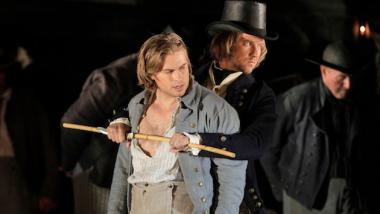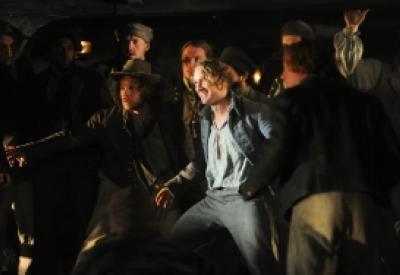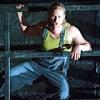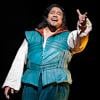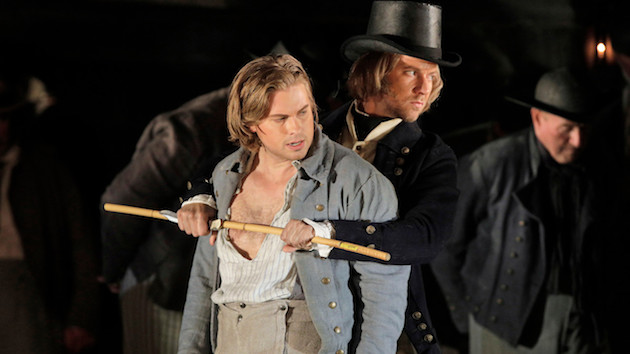
One of the challenges in staging Benjamin Britten’s Billy Budd is the question of tone: how to balance the realistic, almost journalistic aspects of the action — a quasi-historical murder and execution in 1797 aboard an English man-of-war in the French Revolutionary Wars — with the mythic dimensions of this fable about devil and angel.
As with the opera’s literary source, Herman Melville’s final novel of the same name, the narrative demands a double vision from the audience, engaging us both with the details of life in the Royal Navy — the complicated hierarchies, the technologies of sailing, the ubiquitous cruelties — and with the existential questions that occupy the three main characters. Everything, from a plug of tobacco to an off-coast fog, seems to have a double meaning, and these meanings have to coexist.
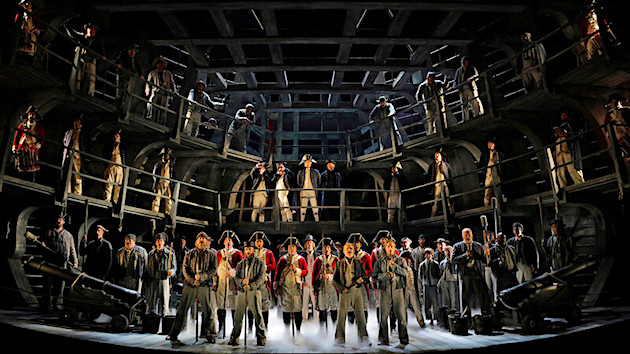
San Francisco Opera’s current run of Billy Budd, which I saw on opening night Saturday, made it happen. Based on a 2014 Glyndebourne production by Michael Grandage, revived for San Francisco Opera by Ian Rutherford, and masterfully conducted by Lawrence Renes, the show palpably reaches out to draw us into the gruesome, claustrophobic world of the HMS Indomitable, while at the same time channeling our emotions along the tale’s heartfelt examinations of cosmic injustice.
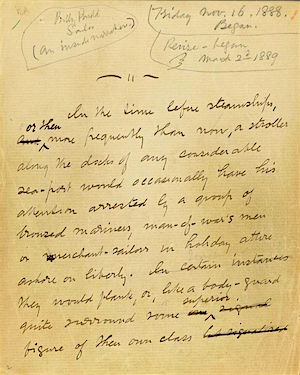
Melville’s novella was left incomplete and disheveled after his death in 1891, discovered among his manuscripts 100 years ago this year — which is also the bicentennial of Melville’s birth. The narrative has ever since fascinated scholars and readers, with its often-circular syntax, dense allusions, and moral ambiguities. The tale centers on the ship’s captain, Edward Fairfax Vere, a reader of the classics who strives to govern his ship and himself with Enlightenment morality (“O for the light!” he cries). Ironically, this philosopher-captain governs a sordid “kingdom” of 74 guns and hundreds of virtually enslaved sailors under an inflexible rule book (the Articles of War) and dependent on a cruel master-at-arms (head police officer), John Claggart, who is quick to flog, to entrap, and eventually to accuse.
Like Milton’s Satan, infiltrating Eden to drag God’s new creatures into sin, Claggart goes after “beauty, handsomeness, goodness” in the person of Billy Budd, an impetuous and resolutely cheerful deckhand. Claggart’s schemes garner enough fake evidence for him to accuse Budd of mutiny, which is serious business in the Royal Navy of 1797, fearful of the spread of sedition and discontent after a recent rebellion. Billy fails to defend himself, but lashes out with his fist, killing Claggart at a single blow. Vere summons his officers to conduct a trial, and though the officers plead with their captain to pardon Billy, Vere refuses. Inevitably, Billy is hanged for sedition and murder.
When Britten took on Melville’s tale, he turned to Eric Crozier, his frequent collaborator, and to E. M. Forster, one of the great storytellers of English modernism, to sharpen and compress Melville’s prose. The librettists framed the story with moving soliloquies for Captain Vere, presented years later as an old man still reeling from the impact of his encounter with evil — “lost on the infinite sea.”
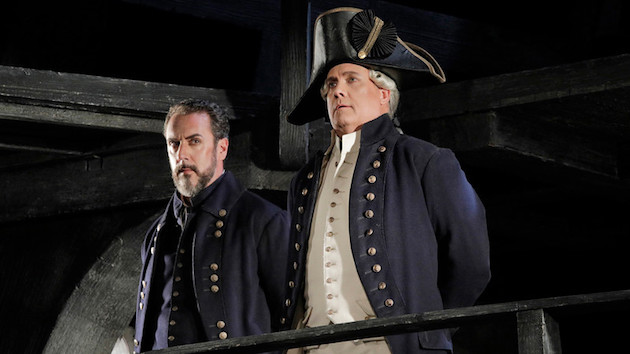
The SF Opera production featured fine performances from all three leads. Tenor William Burden convincingly evoked Vere’s brokenness as an old man and his rigid isolation as captain of the Indomitable, whether confronted with the disgusting Claggart or awkwardly hosting his officers for a glass of wine — a rare moment of comedy as Vere’s sailing master (Wayne Tigges) and First Lieutenant (Philip Horst) rail against the “Frenchified ways” of their enemies. Unfortunately, the libretto gives Vere a final redemptive ending, with some vague religiosity about seeing a “far-shining sail” in the storm, an ending so inconsistent with the captain’s broken spirit that neither Burden’s acting nor Britten’s music could make it believable.
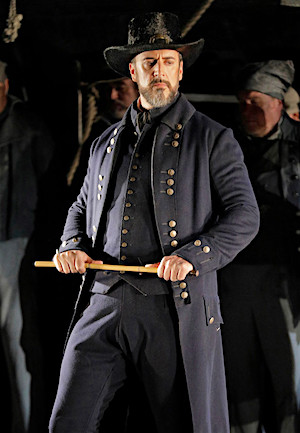
Christian van Horn’s Claggart was villainous enough to merit some melodrama-style booing at his curtain call. But van Horn’s lyrical baritone worked with his accomplished theatricalism to round out Claggart’s character, who longs for the same beauty that he so fiercely destroys, the “light” (as he sings in a parody of the Gospel of John) that “shines in the darkness and the darkness comprehends it and suffers.” The portrayal of this “Satan” was, as it should be, appallingly gripping.
The title role was sung with winning exuberance by baritone John Chest, making his SF Opera debut. Chest’s Billy was lithe and charming, giving plausibility to the handsome sailor’s popularity among the sailors (and attractiveness to Captain Vere). Even more to the point, Chest’s singing gave Budd an exciting presence, almost every vocal line imbued with vitality. The ballad-like lament that Billy sang in the moonlight as he waited for the morning of his death (accompanied by a lovely piccolo solo) was delivered with a plangency that conveyed Billy’s still-innocent understanding of the darkness and beauty of the world.
The excellent men’s chorus served the production well in delivering Britten’s counterpointed lines evoking the watery swells of the English Channel. Their wordless growls after the hanging of their comrade were powerful in their expression of discontent, though their protest was swiftly put down. The men of the chorus seemed experienced in the sailors’ complicated tasks — cleaning the deck with backbreakingly heavy “holystones,” and heaving and coiling what seemed like unending lines of thick rope. Several singing roles amongst the sailors stood out: John Brancy as Donald, especially in a lively “poetry slam” of a shanty; Philip Skinner as Billy’s grizzled friend Dansker; and Brenton Ryan as a novice sailor broken by Claggart’s cruelty.
Several of the sailors, Billy amongst them, daringly abseiled down on ropes from the top of the extraordinary set, a concave shell, a cross-section of the enormous ship, carved oak ribs enclosing the action like the ribs of a whale, multistory decks looming over the men like the balconies of a prison. A good deal of the singing came from far back at the center of the stage, but the voices carried forward surprisingly well: I felt that the ship’s planking acted both as part of the set and as an acoustical resonator.
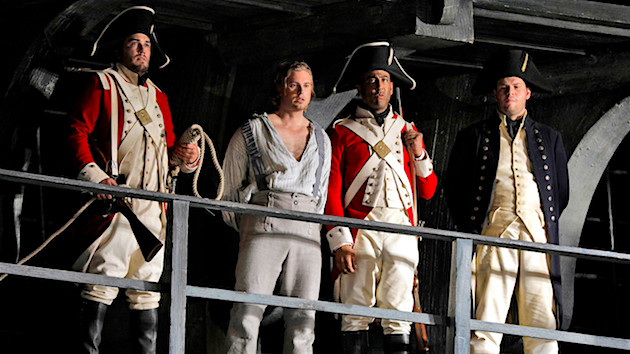
Much of the opera’s emotional impact — and its significance — comes through its complex orchestral writing. San Francisco Opera’s large percussion section brought the visceral rhythms to life; the rich strings gave particular impact to more introspective moments. The extensive winds and brass sections — busy throughout most of the opera — created a web of arpeggiation and counterpoint that matched the intricate webbing of the set and seemed another representation of the story’s crisscrossing networks of conflict and desire. Orchestral interludes marked key transitions in the narrative with Britten’s characteristic inventiveness. Especially powerful was the daring sequence of 34 chords, slow and intricately varied in key and tone color, an interlude that seems to represent the action offstage as Captain Vere goes to tell Billy of his imminent death.
The opera makes much of the dangers associated with speech, the fear of saying what should not be said. Billy, fatefully, stammers: He cannot get the words out to defend himself — the result, one imagines, of some early trauma. Careful, rational Captain Vere will not speak when his officers beg him to weigh in on Billy’s guilt or innocence. All Vere’s officers dread speaking the dreadful word, “mutiny.” So much fear about language, about speaking the unspeakable.
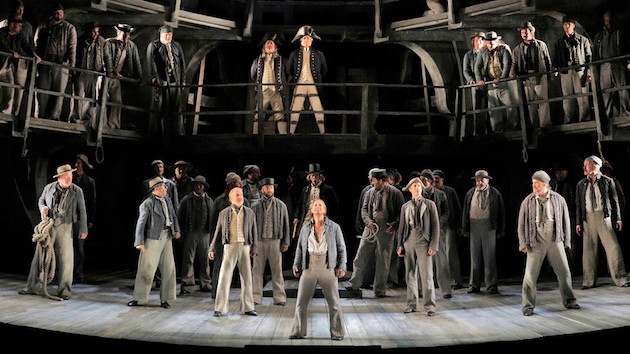
In Britten’s day, did this manifest the desperate silencings of postwar surveillance — the Cold War, the McCarthy attacks? Or was it about the vulnerability of the closeted gay (Britten, Forster, Alan Turing)? or the inability of innocence to answer evil? With opera as the very model of articulate language, where characters sing for whole scenes even in the midst of trauma, it was a stunning move by Britten to write an opera that hangs on the fear to speak, the danger of language.
San Francisco Opera’s production of Billy Budd runs five more times in September. Don’t miss this nearly perfect production of a modernist masterpiece.

